Harvard vs Trump
- Madison Shanfeld
- Jun 9, 2025
- 5 min read
By: Madison Shanfeld
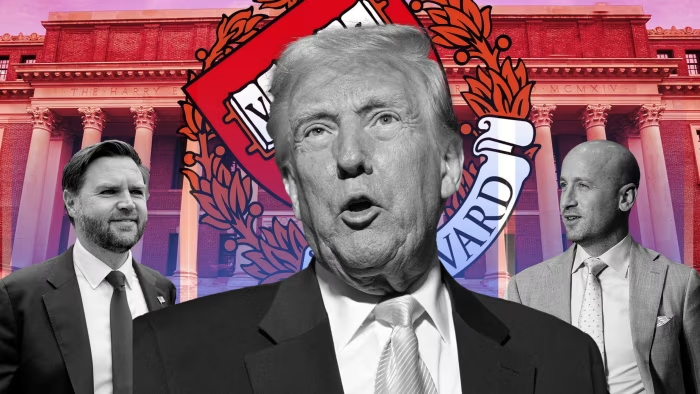
Introduction
Harvard University has cemented itself as one of the most prestigious educational institutes, not only in the United States, but in the world. It is known for producing great minds
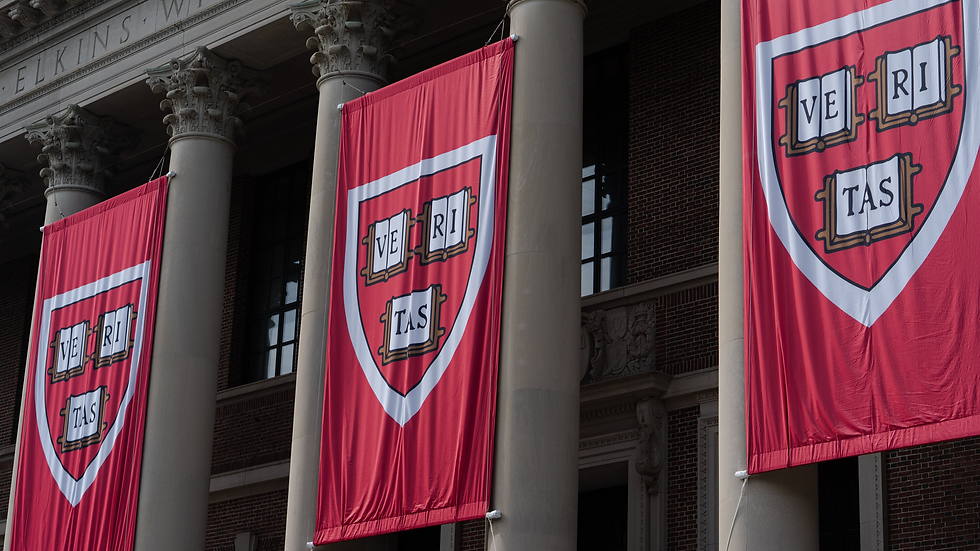
and brilliant discoveries, however, it is also known for having liberal ideology and strong willed students and staff. The modern Trump Administration has also established itself as a headstrong body, willing to push past limits, whether that be for good or bad, and is making incredibly polarizing decisions throughout their reign in office. In addition, Trump’s Administration and supporters are known for having a loud, conservative ideology. So, what will happen when these two, quite different, strong institutions go head to head? Luckily, or unlucky depending on who you ask, the public doesn’t have to theorize, because it is happening, right now.
Timeline:
The Initial Monetary Battle
It began on March 31st when the Department of Education reviewed the $255.6 million in contracts, as well as $8.7 billion in multi-year grants. This assessment came from the antisemitism task force after the abundance of pro-Palestinian protests occurring on several college campuses, particularly in the north-east.
On April 11th, the federal government issued a letter to Harvard University stating the provisions required of the establishment should the university wish to maintain a monetary
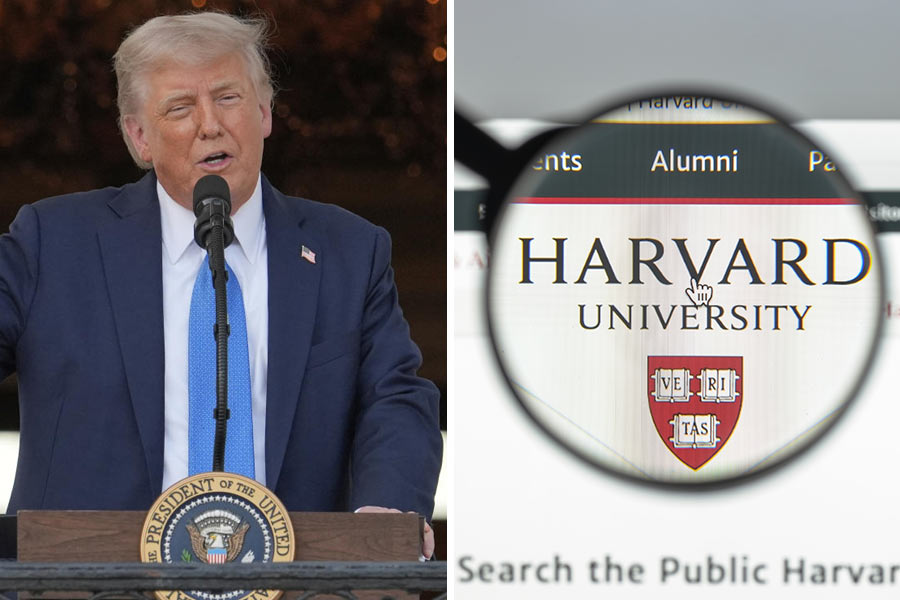
and financial relationship with the government. Some of the changes included the complete discontinuation of all DEI programs, an adoption of diversity of viewpoints across students, staff, and departments, and a reduction of power and leadership positions held by the students and staff. The government gave Harvard until August of 2025 to make their final commitment
Only three days later, on April 14th, Harvard responded to the letter. They strongly rejected the letter and claimed that there were several legal bounds being pushed with these demands.The Department of Homeland Security responded swiftly two days later with news that the Trump Administration will be canceling $2.7 million worth of grants to Harvard.
The Battle Expands- Domestically and Internationally
On the same day when Homeland Security announced the cut grants, they also proclaimed that Harvard will be barred from accepting international students, which comprised around 27% of the student body in the 2024-2025 school year. On April 21st, Harvard officially filed a lawsuit against Trump’s Administration by citing there had been breaches of the First Amendment and claiming there were improper procedures occurring when their funding and grant money was cut. Additionally, they claim that these cuts put the university, its independence, and critical research at risk.
Harvard joins forces with 611 other universities on April 22nd, including Georgetown,
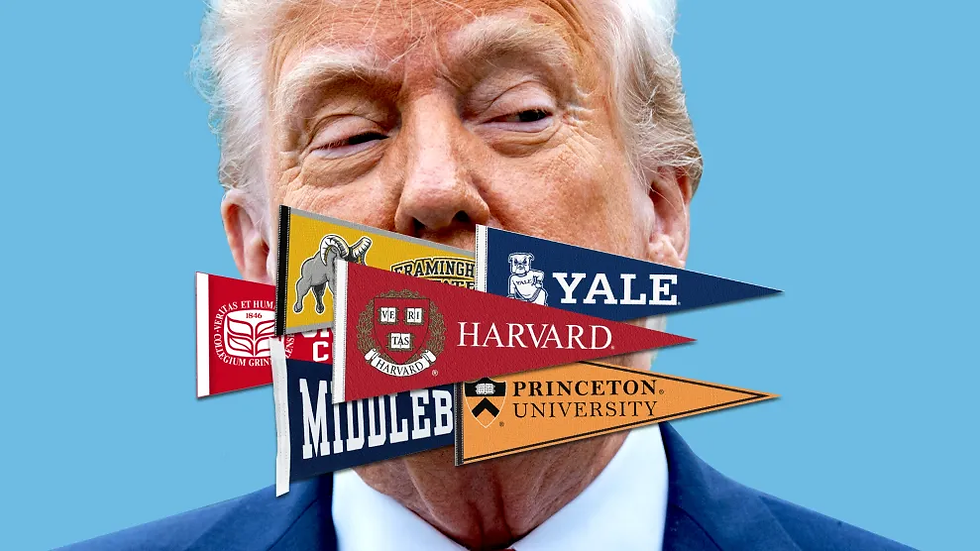
Columbia, Northwestern, UVA, Duke, Brown, University of Michigan, Yale, UC- Berkeley, Cornell, and MIT, to draft a letter addressing the actions of the federal government against higher education institutes. In this letter they touch on the “unprecedented government overreach and political interference” of the Trump Administration and how it is endangering the modern and future higher educational opportunities in the United States. It also addressed how the power to create curriculum, leadership, staff, and students, should remain with the universities themselves. Overall, it is becoming clear that the Universities in the United States will not stand to be silenced and controlled.
It Returns to a Monetary War
Trump announces on his social media, Truth Social, that he will be rescinding the tax-exempt status of Harvard because “it’s what they deserve” on May second. Harvard chooses to respond to this comment during an interview with TIME, stating that there is no legal basis for this removal of tax-exempt status.
On May 5th, Harvard was informed by the Secretary of Education, Linda McMahon, that

Harvard can no longer receive any new grants because of their non-compliance with the federal law. She states that Harvard should not apply for grants as they will not be provided and that they are no longer a publicly funded university. She claims that they are solely privately funded and must rely on their large endowment and plethora of wealthy alumni. The president of Harvard, Alan Garber, responds to McMahon a little over a week later by claiming that the motion on Harvard’s campus to end antisemitism is being undermined and hurt by the government overreach of the constitutional freedoms of Harvard.
In response to Garber, the antisemitism task force freezes another 450 million dollars in funding and the Department of Energy ends an $89 million grant for scientific research because of “racial discrimination”
Another Attack for the International Student Population
Yet again, on May 22nd, the Department of Homeland Security prohibits Harvard from accepting any international students as well as forces any currently enrolled students to transfer schools. Secretary Noem claims that Harvard is being held accountable for fostering antisemitism, violence, and coordination with the Chinese Communist Party on campus. She also claims that it is a privilege to enroll international students to the student body and to benefit from their increased tuition payments. These comments and actions taken against the university results in Harvard filing another lawsuit. On May 23rd, the lawsuit was filed and a federal judge reinstated Harvard’s power to enroll and educate foreign born students while the case is active in the courts. Four days later, on May 27th, the United States General Services Administration sent a letter to all the federal agencies requesting a cut of all funding to Harvard University, requiring them to look for alternate pathways to financial support as a response to Harvard's continued pursuits against the federal government.
The judge that allowed the continued enrollment of international students on campus expanded the injunction as students and staff protested the actions of the Trump
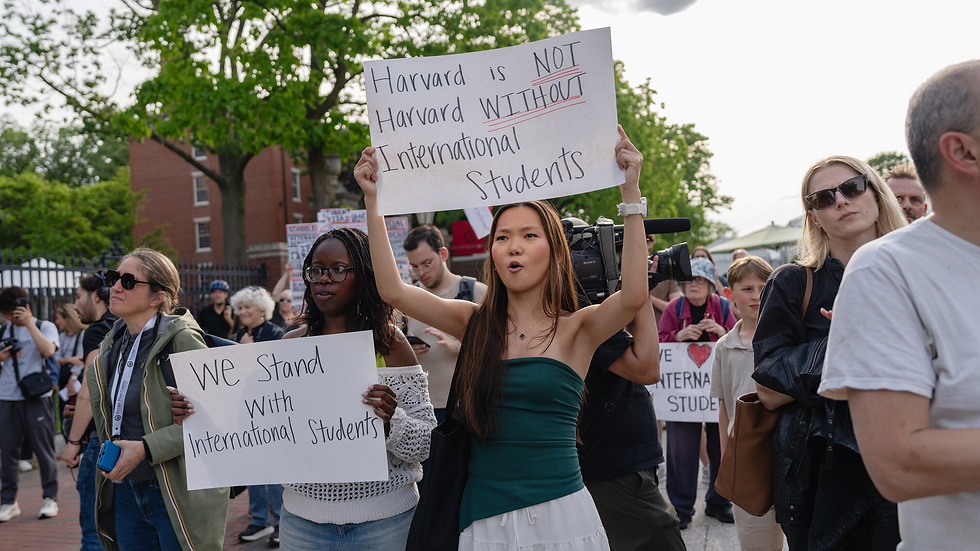
Administration by dressing completely in white and wearing pins and merchandise claiming that “Without our International Students, Harvard is not Harvard” In response, Trump attempts to issue another suspension of Harvard student visas on June 4th in hopes to bar the international students from the university. He did this by not allowing them to enter the country for the next six months. The next day, a federal judge yet again ruled in favor of Harvard when the university attempted to expand their lawsuits to include the new policy with the students’ visas
Overview and Summary
The timeline seems messy and confusing when fully outlined like above. However, there are some basic facts that will help to clean up the details moving forward. First of all, there
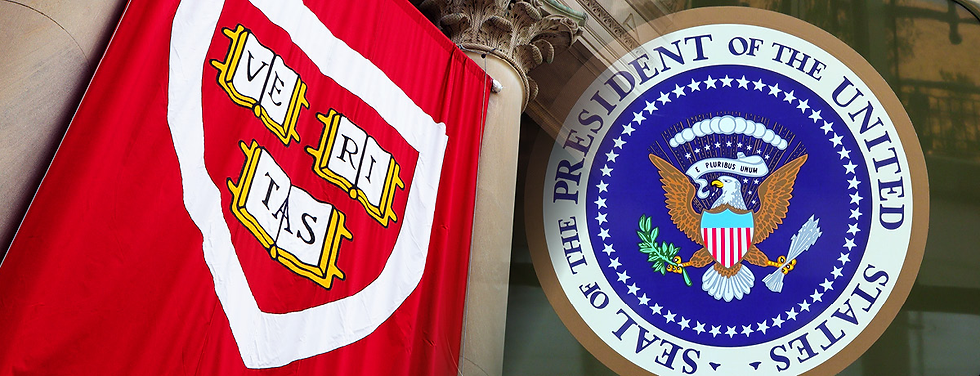
are two lawsuits occurring simultaneously. One is focused on federal funding and the other is focused on international students. The heart of the argument is based on government overreach, or the government going outside of its powers and infringing on the rights of citizens or institutions, as well as autonomy for universities separate from the federal government. Harvard is upset that they are being forced to change their core values and morals in order to receive funding from the government, and the Trump Administration is upset because Harvard is refusing to listen to the demands of the federal government. The first hearing is scheduled for July 21st, so there are no results for either lawsuit thus far and there will most likely be more movement and actions taken from both sides before the first hearing. New events are likely to change the makeup of each lawsuit, however, the core of the argument from Harvard will probably remain the same.



Comments